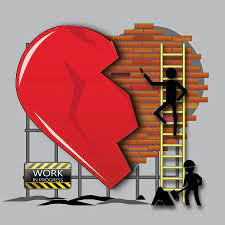Know When To Work On Your Love Life

If you find yourself making the same mistakes over and over again in your love life…it’s time to work on your love life. If you’re stuck feeling lonely all the time, feeling chronically disappointed, experiencing repetitive painful love relationships, or just a lot of lousy breakups…it’s time to work on your love life. If you’ve made a decision to avoid love altogether because it’s too painful, and you’re resigned to living without love in your life…it’s time to work on your love life.
Let’s start by defining what working on your love life really means. My definition is to make improvements in your psychological ability to form and sustain a healthy love relationship. You don’t have to look too far these days to find plenty of public and private examples of people suffering the consequences of not knowing how to work on their love lives. From elected officials, public personalities, to friends and neighbors, people who are living with painful love lives without any idea of how to improve them. And most of these individuals are simply not receptive to psychotherapy or couple therapy.
Knowing when to work on your love life is without a doubt a quality of life issue. Imagine making the same love life mistakes over and over without ever considering the possibility that the correction lies in one’s own psychology? In my mind, it would be the same as allowing a physical illness to go untreated just because the afflicted person believes that health is about luck and nothing can be done about it except to hope for the best. Come again?
This is how you work on your love life:
1. First as always, you have to be aware of having a love life problem. Not a small hurdle, unfortunately, since it is so easy to remain unconscious about the unhealthy aspects of one’s life. In this awareness of the problem, you are honest with yourself, admitting to yourself that your love life “needs” work. Look at all the other things in life we work on: our financial lives, our work lives, our social lives, our physical lives, our medical lives….need I say more? Why and how do our love lives get a pass?
My current theory is that for the longest time, our families of origin were considered the exclusive place where you get your “love life training.” Off limits to non-members of course. Even the courts, religious institutions, and schools were very careful about crossing that family boundary when it came to certain topics like “love relationships and marriage” (who to love, how to love, where to love, when to love, etc.).
As a consequence, healthy or unhealthy, love relationship experiences remained largely inter-generationally controlled. The good news is, in the 21st century we have allowed ourselves to be a bit more critical of what gets taught in the family of origin and the importance of finding oneself beyond the family of origin. Let’s hope this trend continues.
2. You have to stop blaming your love life disappointments simply on not having found the “right one.” As we have become more psychologically sophisticated, there is a growing understanding and acceptance that we create our present love life experiences based on what we have “unconsciously learned” about love relationships from our past relationship experiences starting from the beginning of our lives. For example, consider the family of origin as the first and most impactful emotional classroom you will ever be a member of. Again, the tenacity of our love life problems appears to be related to the fact that what we learn in that early classroom is unconsciously learned and reinforced. Realizing that we are in large measure creating our own love life experiences guided by what we have unconsciously learned about love relationships is the first step in getting our love lives back.
3. Dedicate yourself to finding out what is in your psychological love life, the learned mental blueprint in charge of shaping your love life experiences. With a new dedication to consciousness in your love life, and an understanding of how what you’ve learned can be “unlearned,” you can begin taking back control of your love life from past relationship experiences and/or other people’s love life influences. This process, in a nutshell, is precisely how to effectively work on your love life.
My wife Victoria and I developed a simple method of guiding, supporting, and strengthening a person’s ability to unlearn what they’ve learned about love relationships that is complicating their ability to form and sustain a healthy love relationship. We call our therapeutic intervention a Love Life Consultation. Consultations are focused on achieving love life objectives by strengthening a person’s ability to identify their learned psychological barriers and the corrective experiences required to make dramatic improvements in their particular love life.
All comments and inquiries are welcome. Tell us about your love life.
Dr. Thomas Jordan, clinical psychologist, author of Learn to Love: Guide to Healing Your Disappointing Love Life. Need help fixing your disappointing love life? Confidential Love Life Consultations available by phone, inquire at drtomjordan@lovelifelearningcenter.com.
